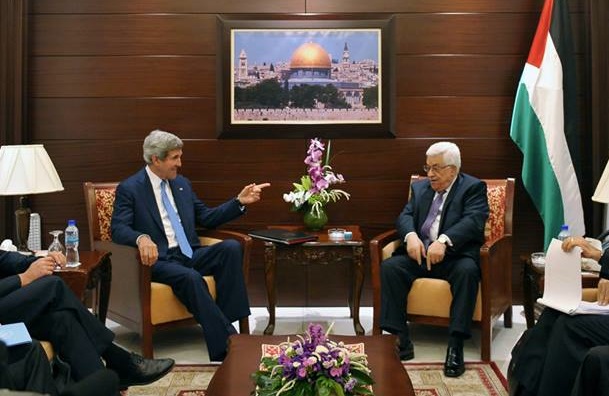Since being sworn in as secretary of State, John Kerry has had to grapple with many issues. But none have taken up more of his time than the Israeli-Palestinian issue and new obstacles keep appearing.
Kerry has traveled to the region five times and met with Israeli Prime Minister Benjamin Netanyahu and Palestinian President Mahmoud Abbas it seems on countless occasions, all in an effort to persuade them to revive peace talks after almost four years of deadlock. Unfortunately, both leaders head fractured governments and face internal opposition that makes them resistant to even modest compromises. And both are absorbed with domestic issues.
For Abbas, this has meant finding a replacement for former Prime Minister Salam Fayyad. His first choice, Rami Hamdallah, quit after two weeks. For Netanyahu, it has meant seeing his own Likud Party pick deputy defense minister Danny Danon, an opponent of the two-state solution, as party president.
| Peace between Israelis and Palestinians cannot be ignored and it will never go away until it is resolved. |
Like many secretaries before him, Kerry has doubtless found the experience of dealing with this issue to be maddening, frustrating and exhausting. His original deadline for getting a decision to resume talks slipped from May to early June to late June—and now seems to have been extended all the way to the opening of the United Nations General Assembly in September.
Kerry came into office believing he could entice Palestinians back to the table with promises of economic aid and could attract Israelis with the promise of wider regional acceptance, as promised by the revived Arab Peace Initiative he promoted. But neither side has proved to be easily seduced.
So far, Abbas has refused to withdraw his two key demands: that the Israelis freeze all settlement building beyond the Green Line and that the negotiations begin on the basis of the 1967 border as a starting point, both of which Israel has rejected.
Netanyahu is prepared to have some sort of undeclared or informal settlement freeze or slowdown but the second condition is entirely unacceptable to him—and certainly to the bulk of his Likud Party, which has largely turned against the two-state solution and now advocates annexation of vast swathes of the West Bank.
Israel may be weighing releasing some Palestinian prisoners to provide Abbas with some political cover. It remains to be seen if this will be sufficient.
Kerry has also attempted to enlist the support of prominent American Jewish organizations, calling on them explicitly in a speech to the American Jewish Committee on June 3 to join the “great constituency of peace.”
While J Street and other organizations, notably the Union for Reform Judaism, were quick to endorse Kerry’s call, others hung back for several days before issuing tepid statements of support. Support grew in response to a statement from Israel’s Housing Minister Naftali Bennett, who told a settlers’ conference that Israel should “build, build, build” in the Palestinian territory and annex over 60 percent of the West Bank immediately.
Nothing good could result from the failure of Kerry’s initiative, which would embolden extremists on both sides while weakening moderates.
Among Palestinians, we could expect to see the continued meltdown of the Palestinian economy leading to a possible resurgence of violence. Among Israelis, we could expect to see the settlement movement continue to grow in the absence of talks. And at some point in the not too distant future, the two-state solution would become unviable.
Israel would then face the dilemma that Bill Clinton described: ruling over another people while denying them democratic rights or granting them such rights and losing Israel’s Jewish majority.
What may save Kerry’s efforts is the fact neither side wants to be blamed for killing his initiative. For 20 years, the two-state solution has been the only game in town. Israelis and Palestinians know in their hearts that they have to find a way of living together, and ending the conflict remains a vital U.S. strategic interest.
That’s why president after president and secretary after secretary have been drawn back to this issue, some willingly, others more reluctantly. It is the “Great White Whale” of U.S. diplomacy. It cannot be ignored, it will never go away until it is resolved.
Alan Elsner, a former State Department and Jerusalem correspondent for Reuters, is Vice President of Communications of J Street, a nonprofit group that advocates for a two-state solution.







0 Comments